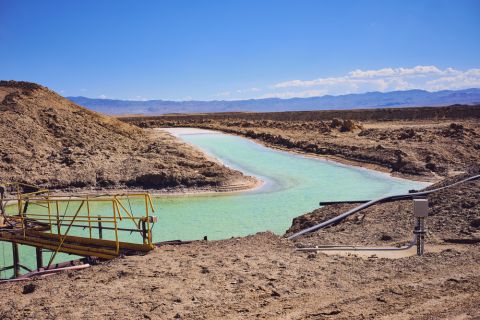Calgary-based Alberta Energy Co. Ltd. (NYSE: AOG) and PanCanadian Energy Corp. (NYSE: PCX) plan to merge, forming EnCana Corp. with an enterprise value of more than C$27 billion, making it Canada's third-largest publicly traded industrial entity. It will be North American's largest independent in terms of proved reserves and undeveloped land, according to PanCanadian chairman David O'Brien. "Neither company is being sold. We are coming together to create a more powerful company that will be better able to compete in an international business going forward." Alberta Energy president Gwyn Morgan adds, "We are bringing together two of the best oil and gas producers in the business to create a company with a tremendous growth profile, a low-cost structure and the ability to create more profitable growth." Initial market reaction was mixed. PCX closed US$1.95 lower at US$26.35 on the New York Stock Exchange the day the merger was announced, while AOG rose US$1.38 to US$38.37. Analysts generally approved. "It creates a true Canadian super-independent with size, liquidity and decent-sized assets," says Matthew L. Janisch of BMO Nesbitt Burns in Houston. "[EnCana] will get good near-term growth from Alberta Energy and long-term discoveries from PanCanadian. The near-term challenge will be to integrate the two companies because it's a true merger of equals. But it will give Canada-where the E&P industry has had a for-sale sign out for about 18 months that's been irresistible to many U.S. producers-a heavyweight capable of competing with them." Stephen Calderwood of Salman Partners in Calgary says, "Investors here hate to hear remarks that suggest nationalism. Still, it was a factor. It's an issue that's discussed at length because so many Canadian producers have been targets for U.S. acquirers. Most of the time, shareholders are quite happy when that happens because they get a premium, primarily because of the currency difference. There isn't one here because both companies are Canadian. But there's still a possibility that a major from outside the country will come in with a counteroffer for one of them." Terry S. Peters of HSBC Securities (Canada) Inc. in Toronto says, "It does have to be viewed as somewhat defensive...Each is a size that would make it a good [acquisition] target. Together, they become a very strong powerhouse in the Western Canadian Sedimentary Basin and in the gas business. They will lever that position to pursue bigger opportunities. I think it's going to be very hard for investors to ignore a company of this size and scope. When the dust settles sometime next fall, EnCana will have the recognition to attract investors interested in North American oil and gas." Standard & Poor's placed its ratings of Alberta Energy's credit on watch, with positive implications. Moody's Investors Service put its rating of PanCanadian on review for downgrade. Alberta Energy stockholders are to receive 1.472 common shares of PanCanadian per share of Alberta Energy. The deal break-up fee is C$350 million. RBC Capital Markets, Credit Suisse First Boston Corp. and Peters & Co. Ltd. advised PanCanadian. CIBC World Markets Inc., Merrill Lynch & Co., Kern Partners Ltd. and First Energy Capital Corp. advised Alberta Energy. O'Brien will be nonexecutive chairman and Morgan will be president and chief executive officer of EnCana, whose board will consist of an equal number of directors from each company. Janisch says, "PanCanadian always has had a very strong balance sheet. The only reason it has any material debt is that it paid a significant dividend to be spun off from Canadian Pacific Ltd. If it wasn't for that, it probably would have less than C$1 billion of debt-hardly anything for a C$10-billion company. Alberta Energy is more leveraged financially, but it also has significant midstream assets that are tolerant of higher debt." "It's about getting larger," Calderwood maintains. "This company will be able to operate competitively in any area of the world-not with a BP or a Shell, but with any other independent, be it American or European. This ability to compete is one of the main motivating factors. Another is that the resulting level of debt will be more acceptable for both. PanCanadian was slightly underlevered and Alberta Energy somewhat overlevered." Currently depressed oil and gas prices are a key factor in the merger. "When you look at either one of our companies, this would be an extremely bad time to sell," Morgan says. "What we tried to do is put something together that would provide advantages to shareholders of both companies. There will be some dilutive effect in the short term. On the other hand, our earnings per share will increase. Also, when you look at the valuation of the discoveries that PanCanadian has made, they also won't be on the books for several years. "It also brings us a much stronger balance sheet that, quite frankly, will provide each of us a longer-term continuous cycle of growth than if we'd stayed on our own." -Nick Snow
Recommended Reading
Baker Hughes Awarded Saudi Pipeline Technology Contract
2024-04-23 - Baker Hughes will supply centrifugal compressors for Saudi Arabia’s new pipeline system, which aims to increase gas distribution across the kingdom and reduce carbon emissions
M4E Lithium Closes Funding for Brazilian Lithium Exploration
2024-03-15 - M4E’s financing package includes an equity investment, a royalty purchase and an option for a strategic offtake agreement.
Laredo Oil Subsidiary, Erehwon Enter Into Drilling Agreement with Texakoma
2024-03-14 - The agreement with Lustre Oil and Erehwon Oil & Gas would allow Texakoma to participate in the development of 7,375 net acres of mineral rights in Valley County, Montana.
California Resources Corp. Nominates Christian Kendall to Board of Directors
2024-03-21 - California Resources Corp. has nominated Christian Kendall, former president and CEO of Denbury, to serve on its board.
Jerry Jones Invests Another $100MM in Comstock Resources
2024-03-20 - Dallas Cowboys owner and Comstock Resources majority shareholder Jerry Jones is investing another $100 million in the company.





